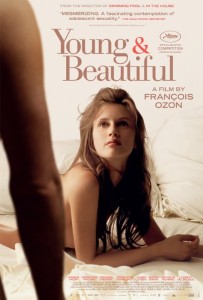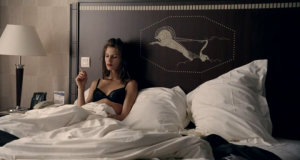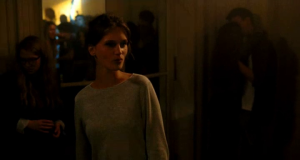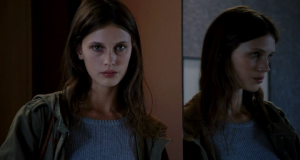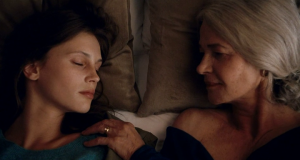Young & Beautiful (Jeune & Joyle) (Francois Ozon) (2013)
Young & Beautiful (Jeune & Joyle)
Directed by: Francois Ozon in 2013
With this movie, following the sexual initiation of a teenage girl, Isabelle, from losing her virginity on a summer holiday to her journey into online prostitution, Ozon offers his view, which is at the same time disillusioned and poetic, on a lot of critical aspects of our contemporary age like the new family relationships and structure, Internet, the symbolic weight of money, the subtle but painfully burning nihilism, the sense of void and the holes in relationships and affections, beauty, sex…and what does it mean to bloom to life, while searching for an individual path, thrown in all of this.
In fact Ozon’s view isn’t judging or moralistic: it records the inner and outer facts, with sometimes a subtle voyeuristic pleasure, and it looks for a poetic on the difficult road of Isabelle (the gorgeous Marine Vacht).
Because of this, this movie is somehow placed between Bunuel’s Belle de Jour and Eric Rohmer’s romanticism. While Sèverine in Belle de Jour seeks in the prostitution for a liberation from the rigid social norm, while being at the same time conscious and unconscious of this and her own inner life, and thus she clashes with the erotic repression and the alienation which descends from it, Isabelle finds herself in a situation which is in many ways the reverse, and for many aspects the mirror, of the one told by Belle de Jour. A situation which is, for this reason, extremely similar in it’s foundations.
Isabelle lives in an age in which every prohibition has been destroyed in the name of the (not only) sexual consumerism of bodies and feelings and finds herself incarcerated in a web of hypocrisy, like the one built by her family which mask a deep failure to communicate and the dominion of incomprehension, the total lack of authentic emotions and love and a deep narcissistic isolation, with good economic and material wealth and a regular life routine. She also find herself trapped in the web of nihilism, like the one of her friends, who in their relationship dynamics aren’t really different or much better and less degrading from the ones that Isabelle lives while prostituting herself.
All these people aren’t capable nor really interested in deciphering Isabelle’s silences and voids, which are the gateway to her inner dimension (regarding this, the disco scene is emblematic, with the sudden switch of music towards a Francoise Hardy’s song).
Isabelle, being intelligent, can’t deny the fact that all these voids and missed human contacts are, in fact, a way to cover the subtle violence which reigns in both her family and her friends.
In her family both her parents are adulterous and are hiding it, her brother is more interested in his voyeurism than her sister and her stepfather has a mix of incestuous drives and indifference towards her. Her friends, on the other hand, are dominated by cruel massification and tribalistic ways to relate. The result is the same in both situations: the objectivation, deep alienation and depersonalization of oneself.
Isabelle, thus, makes an act of courage, she desires to understand and experiment, using the instrument of coherence to the extreme and the excess. She lives in a world in which the values of sex and money are dominant, and she decides to investigate them by prostituting herself. A task which is not capable to fill the affective and relationship void, which is the silent and burning dilemma of hers. A void which is also the source of her deep anhedonia and indifference towards the external world and the large part of the other people. She doesn’t have any kind of physical pleasure in the intercourse and she doesn’t spend the money she earns by selling her body, she simply put the money into an hidden wallet and doesn’t care afterwards. These reactions aren’t a nihilistic “no” to life, on the contrary they are a vitalistic “no” to an inauthentic and false way of living, a first step towards the path of inner research and not a simple reaction to the situation she’s living.
In fact, I think that a strictly redutionistic psychoanalitical reading of the movie, which would identify the act of going with men much older than her as a way to fill void left by the abscence, physical and emotive, of her real father (who, emblematically, donates only money to her) and thus spotting in this the ghost of the incest, would be a partialization of the movie. This interpretation has it’s merits and it’s validity, however personally I think that the broader interpretation of the relationship and affective voids is more fitting. Isabelle, in fact, is looking for the relationship dimension and, linked with this, the inner dimension of individual meaning. She decides to use the name of her grandmother, Léa, as a nickname for her prostitution, a way to repair a continuity of feelings and relationships. Also, she accepts to try a relationship with one of her friends (which would quickly fail) only after the thrauma of her client’s death, who, not by chance, was the only that estabilished, in a distorted way, a relationship with her.
While Sèverine in Belle de Jour clashed with the repression of desire, Isabelle clashes again it’s dispersion and mercification, which brings also to it’s extinction, since the alterity with is it’s prime mover vanishes, and, linked with this, nihilism and the search of an individual path. A path which can’t be walked under the sign of unconsciousness, like D did, but only by the expansion of consciousness, which also is it’s driving force.
Isabelle is courageous because she refuses to turn her head the other way to deny the grim reality of her family or to accept values that aren’t really hers, like her friend’s deep nihilism. She, on the contrary, dives deep into her void, hoping to came out from it as a winner.
Isabelle’s rebellion is a silent and inner one, but not for this reason it’s less powerful, since it’s touching the essential: the necessity of individuation and the refuse of a rotten symbolical order.
The closing sequence of the movie should be read using these glasses, as a liberating experience which is finally capable to have an authentic encounter, without lies, and thus to fill a bit of her void, in a positive way.
